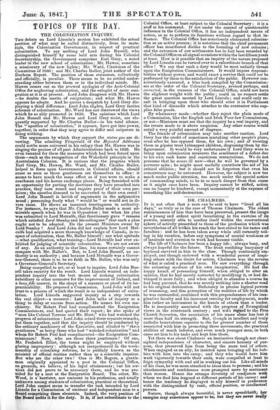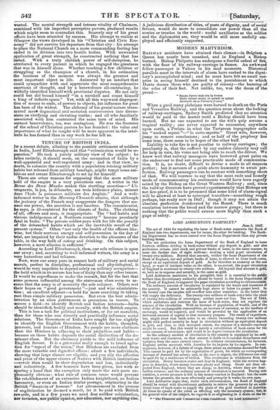IT is not often that a man can be said
to have "lived all his days," so truly as in the case of Thomas Chalmers. The oldest reminiscences of him that have been preserved, present the image
of a young and ardent spirit luxuriating in the exercise of its powers, scarcely able to confine itself within the conventional
sphere of activity prescribed to those of the profession which was nevertheless of all within his reach the best suited to his tastes and faculties : and he has been taken away while still earnestly toil- ing in his vocation, before any symptoms of mental weakness or of lassitude and aversion to work had become visible.
The life of Chalmers has been a happy life ; always busy, and always hopeful for the future. The fresh confiding buoyancy of boyhood survived in him to the close. Though continually em- ployed, and though endowed with a wonderful power of inspi- ring others with the desire for action Chalmers was the reverse of what is called a practical man. He saw everything through the colouring medium of his own imagination. He had the happy knack of persuading himself, when obliged to alter an opinion, that he had merely corrected by modifying it, or had de- veloped it more fully ; and when obliged to abandon a course had long pursued, that he was merely striking into a shorter
to his original destination. Deficiency in precise logical powers of reasoning, and dim perception of the realities of life by which
he was surrounded, combined with this preponderance of his ima- ginative faculty and his incessant craving for employment, made him rather an instrument in the hands of others than a leader.
He is inseparably associated with the progress of Evangelical views in the nineteenth century ; and with regard to the Free Church Secession, the association of his name alone has lent it more than half its strength. But, though in intellect and truly catholic benevolence superior to the far greater number of those associated with him in promoting these movements, the practical abilities of much inferior, and even much younger men, in both cases set him to his tasks and kept him there. Yet there was about Chalmers an instinctive though not clear- sighted independence of character, and sincere honesty of pur- pose, that preserved him from being the mere tool of others. When engaged as an ally, he insisted upon bringing all his hob- bies with him into the camp ; and they who would have him
work vigorously towards their ends were compelled at least to feign sympathy with and aid in working out his. Like all minds of his class, he was more attached to ideas than to persons ; and his attachments and confidences were prompted more by sentiment than reason. Hence the strange diversity of coadjutors with whom we find him leagued at different periods of his career : and hence the tendency he displayed to ally himself in preference with the distinguished by rank, official position, or intellectual powers. Nature, though always bountiful, is never spendthrift; her energies may sometimes appear to be, but they are never really
wasted. The mental strength and intense vitality of Chalmers, combined with his imperfect perceptive powers, produced results which might seem to contradict this. Scarcely any of his great efforts have been attended by success. His attempt to realize at Glasgow the views developed in his "Christian and Civic Eco- nomy" did not survive his departure from that city : his attempt to place the National Church on a more commanding footing has ended in its division into two hostile bodies. With unwearied application of great strength, he constructed nothing that has lasted. With a truly childish power of self-deception, he attributed to every pursuit in which he engaged the greatness that was in himself alone. Whether teaching a few children or struggling as the champion of a church, in his estimation the business of the moment was always the greatest and most important object in life. Animated by an intellect that could sympathise with and appreciate the most comprehensive exertions of thought, and by a benevolence all-embracing, he wilfully identified himself with provincial disputes. He not only could but did bound himself "in a nutshell and count himself a king of infinite space." Yet, with all this wayward dispropor- tion of means to ends, of powers to objects, his influence for good has been of the widest. The alchemy of his genial nature trans- muted mere dogmatical and sectarian controversies into discus- sions on vivifying and elevatin„o. truths; and all who familiarly associated with him contracted the same turn of mind. His earnest benevolence, too, was contagious. He was the Socrates of the school of Christian pastors he has founded : the value and importance of what he taught will be more apparent in the intel- lects he has formed than in any work he has left us.

























 Previous page
Previous page